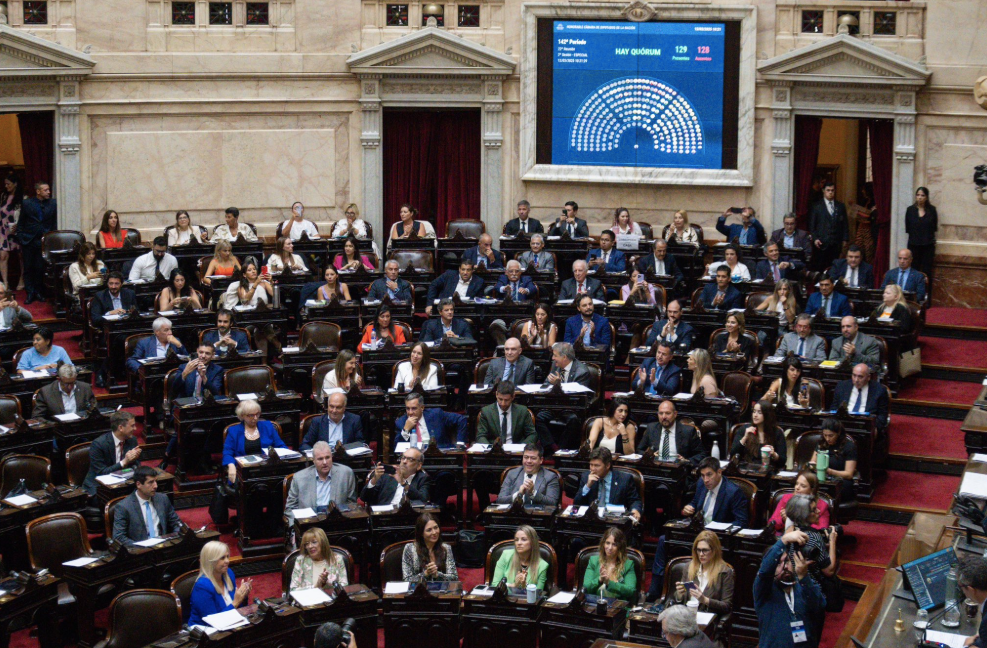On Wednesday (12), the Chamber of Deputies in Argentina began debating the Clean Record Law, a proposal aimed at barring the candidacies of individuals convicted in the second instance. The measure, supported by President Javier Milei’s government, has reignited political polarization in the country, particularly due to its direct impact on former president Cristina Kirchner, who would become ineligible if the law were passed.
The project, which had already been discussed behind the scenes in Congress, was officially presented by the ruling party as a tool to ensure greater transparency and integrity in Argentina’s elections. The proposal is inspired by similar laws adopted in other countries, such as Brazil, where the Clean Record Law has been used to prevent candidates with a criminal conviction history from running for office.

However, for the Kirchnerist opposition, represented by the parliamentary bloc Union for the Homeland, the proposal has a specific target: Cristina Kirchner. Opponents accuse the government of promoting a political attack disguised as electoral reform and warn of the risk of judicial interference in the democratic process.
If approved in the Chamber, the bill would still need to pass through the Senate, where the Milei government will face an even tougher battle.
Cristina Kirchner, who served as Argentina’s president from 2007 to 2015 and as vice-president until the end of 2023, was sentenced in the second instance to six years in prison for allegedly favoring businessmen in awarding public contracts during her administration. The case, known as the “Vialidad Case,” involved multimillion-dollar contracts with companies linked to businessman Lázaro Báez, considered a close ally of Kirchnerism.
Kirchner’s conviction is still subject to appeals in higher courts, but if the Clean Record Law is passed, ineligibility would apply immediately, preventing her from running for any public office in the short term.
Allies of the former president argue that the project was crafted with the sole purpose of “political proscription,” preventing her return to the electoral scene.
“This project has a name and surname, which is Cristina Kirchner, and paves the way for some judges to decide in election years who can run and who cannot,” said Deputy Leopoldo Moreau, one of the leading figures of Kirchnerism, during a session of the Chamber’s Constitution and Justice Committee.
The Milei government, however, rejects this accusation, arguing that the proposal seeks to moralize Argentine politics by preventing candidates convicted of corruption from continuing to run for elective office.
The Clean Record Law establishes that the prohibition of candidacy applies to individuals convicted in the second instance of the following crimes:
- Misappropriation of public funds
- Influence peddling
- Conflicts of interest in public office
- Illicit enrichment of public officials
- Crimes against public administration
The text defines that the restriction will apply if the conviction occurs up to 180 days before the election. If the judicial decision is made after this period, ineligibility will only apply to the next election.
The proposal also raises a delicate legal issue: the ineligibility of a candidate before their conviction becomes final. Currently, in Argentina, the Constitution requires that a defendant only loses their political rights after all appeals have been exhausted. The new law would alter this logic by advancing the punishment to the second instance.
Javier Milei’s allies defend the project as a direct response to the demands of Argentine society, which has long called for zero tolerance toward corruption.
Defense Minister Luis Petri stated that the vote on the law represents a historic moment for the country.
“The long-awaited and necessary debate has begun to prevent corrupt individuals from coming to power. The deputies have a great opportunity to approve a law essential for the Republic. The civil society’s fight was key to reaching this day,” said Petri.
Deputy Lilia Lemoine, from the ruling party A Libertad Avanza, stated that the project aims to prevent politics from continuing to be a refuge for criminals.
“If an ordinary citizen convicted of corruption cannot hold public office, why should convicted politicians be allowed to run for elections? That doesn’t make sense. This law comes to correct a distortion that favored impunity,” said Lemoine.
Even if the project is approved in the Chamber, its fate in the Senate remains uncertain. The Milei government does not have a majority in the House, and the Kirchnerist opposition has a significant number of senators, which could complicate the progress of the proposal.
Furthermore, the approval of the Clean Record Law could trigger a new institutional conflict in Argentina, as many legal experts argue that the measure could be challenged in the Supreme Court for violating constitutional guarantees.
Senator Oscar Parrilli, an ally of Cristina Kirchner, has already stated that the opposition will not accept the proposal without resistance:
“We will fight against this project with all the resources that democracy allows us. They are trying to turn the Judiciary into a political actor, and that is unacceptable.”
On the other hand, the government is betting on public pressure to ensure that the project moves forward. Recent polls indicate that the majority of Argentinians support measures that tighten the rules against corruption in politics.
The vote on the Clean Record Law in the Chamber of Deputies marks a new chapter in the battle between Javier Milei and Kirchnerism. For the government, the measure represents a crucial step toward ending impunity in Argentine politics. For the opposition, it is a judicial witch hunt with electoral motives.
Regardless of the outcome of the vote, the debate over moralizing politics and the Judiciary’s influence in elections will remain at the center of Argentina’s political scene. If approved, the law could drastically change the country’s electoral landscape, preventing Cristina Kirchner and other politicians with pending convictions from running.
Now, the focus shifts to the Senate, where the Milei government will face a new challenge in consolidating this proposal. Behind the scenes, both government and opposition forces are already mobilizing for a battle that promises to be one of the most intense of the year.

